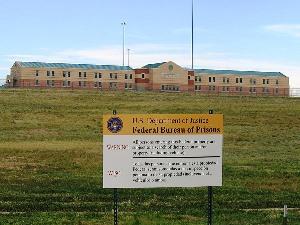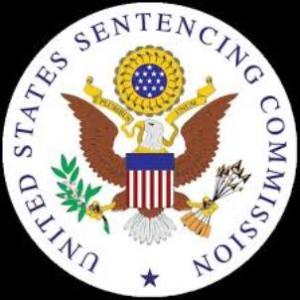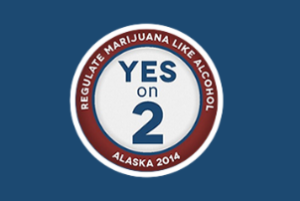Federal drug sentencing reforms adopted by the US Sentencing Commission went into effect today. Not only will new offenders face less time, but people already serving time will be able to seek sentence reductions.
And then there were three (and don't forget DC). Oregon has now joined Colorado and Washington as a state that has legalized marijuana. Voters Tuesday approved Measure 91 with nearly 56% of the vote.
It's a trifecta for marijuana legalization initiatives this year, as Alaska joins Oregon and Washington, DC, in freeing the weed.
DC residents are voting overwhelmingly to legalize the possession and cultivation of small amounts of marijuana in the nation's capitol. Now, it will be up to the city council to move on to tax and regulate marijuana commerce.
California voters Tuesday approved an initiative to turn drug possession felonies into misdemeanors and rejected a trial lawyers' malpractice caps-raising initiative cloaked in the garb of drug testing doctors.
The Florida medical marijuana initiative came achingly close to victory, winning a solid majority of the vote, but not quite the 60% it needed to pass.
In the first election results of the day, voters in Guam approved a medical marijuana initiative. Guam becomes the first US territory to approve it.
The late polls suggest that Oregon is going to be the next state to legalize marijuana.
A medical marijuana initiative won in Guam, but the one in Florida lost despite winning a majority of the votes. There's other news, too.
Trouble is brewing in Detroit and DC, a Texas narc gets in trouble, so does a Miami cop, so does a Camden cop and a suburban St. Louis one.
Oregon's Measure 91 is getting big bucks and using innovative outreach techniques in the final days, the DC council ponders how to implement pot legalization, NYC councilmembers demand the cops quit targeting minority men for pot busts, Denmark funds research on medical marijuana (but not underground trolls!), and more.
It's looking good in Oregon, not so good in Florida; Guam's archbishop comes out against medical marijuana, a conservative PAC funded by the Koch brothers is seeking to peel off "stoner" votes from Democrats, there's cannabis club news from Barcelona and Uruguay, Iran drug executions are in the news, and more
We're waiting for election results--except for Guam, where medical marijuana has already won--Britain's governing coalition continues to implode on drug policy, Paraguay tries to crack down, and more.
Marijuana wins in Alaska, DC, and Oregon; medical marijuana barely loses in Florida, California defelonizes drug possession offenses, New Jersey reforms the bail system, and more
Federal drug sentencing reforms adopted earlier this year by the US Sentencing Commission went into effect today. They should result in tens of thousands of federal prisoners seeing their sentences cut and being released early, as well as ensuring that future offenders are not sentenced so harshly.
The Sentencing Commission, an independent body in the judicial branch which is charged with setting federal sentencing guidelines, voted unanimously in April to reduce the guidelines for most drug sentences. Then, in July, it voted—again unanimously—to make those sentencing reductions retroactive, meaning they will be applied to current federal drug prisoners.Congress had an opportunity to disapprove of the sentencing reductions, but failed to act, so the changes are now in effect.
As of today, current federal drug prisoners can begin petitioning courts for sentence cuts based on what the new guidelines call for. If the courts determine they are eligible for the sentence cuts and a reduction is appropriate, the sentences will be reduced. That will result in some federal prisoners getting out early, but none will be released until a year from today.
The sentence cuts will not, though, reduce mandatory minimum sentences, which are set by Congress. Prisoners serving sentences longer than the mandatory minimum may win sentencing reductions, but not below the mandatory minimum.
(The federal sentencing reform group Families Against Mandatory Minimums provides an overview page on the move and what it means, as well as FAQ page for prisoners and their families.)
For the past two decades, the Sentencing Commission has attempted to rein in the harshly punitive impulses in Congress that led it to impose lengthy prison sentences for even low-level drug offenses in the 1980s. The federal prison population has increased more than three-fold since 1980, driven largely by the war on drugs. According to the Bureau of Prisons, the 98,482 federal drug prisoners make up 48.8% of all federal prisoners.

The federal prison at Butner, NC. Will there be room at the inn? (bop.gov)
According to the Commission, more than 46,000 current drug prisoners will be eligible for sentence reductions through retroactive application of the revised sentencing guidelines. The Commission estimates that the sentence cuts will reduce the federal prison population by 6,500 within five years and more significantly as time goes on.
The Drug Policy Alliance (DPA) applauded the sentencing reductions, and especially the Commission's move to apply them to current prisoners.
"It makes little sense, of course, to reform harsh sentencing laws proactively but not retroactively," said Ethan Nadelmann, DPA executive director. "But that’s what politicians do when they’re scared of allowing people out of prison early. The Sentencing Commission really had no choice but to rectify the moral absurdity of keeping people locked up based on sentences that are no longer the law. What they did was right and just."
"This is an important step toward undoing some of the worst harms of the drug war by allowing people to be reunited with their families," added DPA media relations manager Tony Papa, who served 12 years in prison for a nonviolent drug offense.

The US Sentencing Commission considers retroactivity at a meeting in May. (uscourts.gov)
Sentencing Commission Chair Judge Parris said Congress still needs to get around to passing comprehensive reforms.
"Only Congress can act to fully solve the crisis in federal prison budgets and populations and address the many systemic problems the Commission has found resulting from mandatory minimum penalties," she said. "I hope that Congress will act promptly to pass comprehensive sentencing reform legislation."
Maybe then we can actually reverse the decades-long trend of sustained growth in the federal prison population. Actually, thanks to reforms already passed by Congress, we may see the first decrease in the federal prison population announced next month, when the Bureau of Justice Statistics issues its annual prison population report. The preliminary numbers suggest that the population may have peaked in 2012.
This move by the Sentencing Commission will only accelerate that (presumed) trend, but will only result in sentence reductions for about half of incarcerated federal drug offenders. There is still more work to be done.
back to top
Oregon has become the third state to legalize marijuana. Voters Tuesday approved Measure 91, which will legalize personal marijuana possession and cultivation and set up a system of taxed and regulated marijuana commerce.
The District of Columbia earlier today approved an initiative to legalize marijuana possession and cultivation, but that initiative does not allow for taxed and regulated sales. Colorado and Washington legalized marijuana in 2012. Alaska is voting on a marijuana legalization initiative today, but results have not come in there yet.According to election results compiled by The Oregonian, with two-thirds of the votes counted, the initiative was winning with 53.7% of the vote. That was good enough for the state's largest newspaper to call the election. [Update: Measure 91 finished up with an even more impressive 55.9%.]
Under Measure 91, adults 21 and over will be able to possess a half-pound of pot and grow up to four plants. The Oregon Liquor Control Commission will be charged with drafting regulations and overseeing implementation of the will of the voters. It will act in consultation with the state Department of Agriculture and the Oregon Health Authority.
Personal legalization will not go into effect until next July 1, and legal marijuana commerce will not begin until December 2015.
For drug reformers, Oregon is another feather in the cap on a day that already saw Washington, DC, legalize it.
"It’s always an uphill battle to win a marijuana legalization initiative in a year like this, when young people are so much less likely to vote, which makes today’s victory all the sweeter," said Ethan Nadelmann, executive director of the Drug Policy Alliance. "The pace of reform is accelerating, other states are sure to follow, and even Congress is poised to wake from its slumber."
DPA’s lobbying arm, Drug Policy Action, was the single largest donor to the Oregon campaign and was deeply involved in the measure’s drafting and on-the-ground campaign. The campaign benefited from serious financial backing, spending more than $2 million.
"Having spent years as a prosecutor, I know that Oregon will benefit greatly from regulating marijuana, and that the example set here will influence future states in 2015 and beyond," said former Assistant State’s Attorney and Oregon resident Inge Fryklund, a member of Law Enforcement Against Prohibition (LEAP), which participated in the campaign.
"With Oregon and DC. coming on board, it's clear that Colorado and Washington voting to legalize in 2012 was no anomaly," said Tom Angell of Marijuana Majority "The trend is clear: Marijuana prohibition is coming to an end. As 2016 approaches, we can expect to see many more ambitious national politicians finally trying to win support from the cannabis constituency instead of ignoring and criminalizing us."
New Approach Oregon, the campaign behind Measure 91, was apparently too busy savoring its victory to put out a statement by press time. That's okay; we understand.
back to top
In a trifecta for marijuana legalization initiatives Tuesday, Alaska has joined Oregon and Washington, DC, in voting to free the weed. That makes it the fourth state to do so.
Measure 2 allows adults to possess up to an ounce of marijuana and grow up to six plants (three mature). It also allows individual growers to possess the fruits of their harvest. It will set up a complete system of commercial marijuana cultivation, processing, and distribution under the purview of the Alcohol Control Board -- or, if the legislature chooses to create it, a Marijuana Control Board.
Despite uncertainty generated by inconsistent and conflicting poll results, Measure 2 led throughout the night as the ballots came in. According to the state Division of Election's unofficial results, just before midnight Alaska time, with 42% of the votes counted, Measure 2 was winning with 52.21% of the vote. [Update: Measure 2 finished up with 51.15%.]
But shortly after that, supporters were ready to call the election.
"The results are in, and marijuana prohibition is on its way out," said Rob Kampia, executive director of the Marijuana Policy Project. "Americans are fed up with wasteful and ineffective laws that punish adults for using a less harmful substance than alcohol. The folks trying to keep marijuana illegal are relying on the same scare tactics today that they have relied on for decades, but voters just aren't falling for it anymore. The results are particularly encouraging since voter turnout during a midterm election is typically smaller, older, and more conservative. Clearly, support for ending marijuana prohibition spans the political and ideological spectrums.
Look out for 2016, Kampia said. "Proposals to regulate marijuana like alcohol are headed for the ballots in at least five states in 2016, and they're being considered in legislatures around the country," he revealed. "This year's election was a large step forward, but the 2016 election will be a huge leap toward ending marijuana prohibition in this country once and for all."
back to top
Voters in Washington, DC, today overwhelmingly approved Initiative 71, which will make it legal for adults to possess and cultivate small amounts of marijuana in our nation’s capital.
Partial election results from the DC Board of Elections Tuesday night had the initiative winning handily with around two-thirds of the vote. It was at 64.5% with 11% of precincts reporting at 10pm, the lowest figure of the day. That was enough for supporters to call the election. [Update: Initiative 71 finished up with 64.7%.]"You just made history," Dr. Malik Burnett, policy manager for the Drug Policy Alliance's DC-based Office of National Affairs, wrote in an email to supporters shortly after the polls closed. "Voters passed Initiative 71 in Washington, DC."
Along with long-time DC marijuana reformer, hemp entrepreneur, and political gadfly Adam Eidinger, Dr. Burnett co-chaired, the DC Cannabis Campaign. The effort met with some initial reluctance in the DC drug reform community and managed to make the ballot in large part thanks to early financial support from the activist-minded David Bronner of Dr. Bronner's Magic Soaps. Then DPA came on board, bringing more financial and other resources with it.
Because of District law, the initiative could not address legal marijuana commerce. That is the purview of the DC city council, which has already demonstrated its friendliness to marijuana law reform by passing decriminalization earlier this year. The council is already considering a bill to legalize, tax, and regulate marijuana commerce.
"With marijuana legal in the federal government's backyard it's going to be increasingly difficult for national politicians to continue ignoring the growing majority of voters who want to end prohibition," said Tom Angell of Marijuana Majority. "I've been saying for a while that 2016 presidential candidates need to start courting the cannabis constituency, and now the road to the White House quite literally travels through legal marijuana territory."
For the first time, race played a significant role in a legalization campaign, said DPA director of national affairs Bill Piper.
"This was the first legalization campaign in which the racial disproportionality of marijuana enforcement played a major role," he noted. "Initiative 71 sets the stage for the DC council to create a new model for legalizing marijuana – one that places racial justice front and center."
While the voters in DC have now spoken on marijuana legalization, Congress still has a chance to intervene, but that appears unlikely. Congress has 30 days to act or the measure becomes law, but that require a measure to override the will of District votes to be approved by both Houses and signed into law by the president.
Congress could also attach a rider to the DC appropriations bill barring all funding to implement the measure, but it appears that the bill, which should be approved next month or early next year, will be handled through a budget deal with no riders.
Legal marijuana is coming to the nation's capital.
back to top
Voters in California enthusiastically approved an important sentencing reform initiative Tuesday, but overwhelmingly rejected an initiative that would have imposed drug testing on doctors in the state.
The sentencing initiative, Proposition 47, will change drug possession (and some other low-level non-violent offenses) from felonies to misdemeanors. It is viewed as a significant step in reducing mass incarceration and a retreat from the war on drugs. The popular vote in favor of Prop 47 comes just two years after voters approved another sentencing reform initiative, that one reforming the state's notorious "three strikes" law.The failed initiative that would have imposed drug testing on doctors, Proposition 46, was drafted and backed by trial lawyers and was actually primarily about increasing the caps on medical malpractice liability payments. Drug testing doctors was added on after it proved popular in focus groups. Not surprisingly, Prop 46 was opposed by a powerful and deep-pocketed set of medical interests in what was one of the most expensive initiative campaigns in state history.
According to election figures from the California Secretary of State, with 45% of the vote counted just before midnight Tuesday, Prop 47 was winning with 56.6% of the vote, while Prop 46 was getting trounced with only 32.3%. [Update: With the rest of the votes counted, Prop 47 won with 58.7%, and Prop 46 lost with 32.8%.]
The Drug Policy Alliance, whose lobbying arm, Drug Policy Action, contributed to the smartly named Californians for Safe Neighborhoods and Schools "yes on Prop 47" campaign, pronounced itself pleased with the results.
"The overwhelming support for this reform sends a powerful message nationally, demonstrating that voters are not just ready but eager to reduce prison populations in ways that can enhance public safety," said DPA executive director Ethan Nadelmann.
Under Prop 47, up to 20,000 people doing state prison time for simple drug possession will be eligible to seek sentence cuts, and new prison admissions should drop by between 40,000 and 60,000 a year. And hundreds of thousands of Californians with drug possession felony records will be eligible to have those records automatically expunged, removing barriers to employment, housing, public benefits, and educational opportunities.
The state's county jails, which are chafing under the state's corrections "realignment," will also see reductions in prisoners, with somewhere between 10,000 and 30,000 jail beds freed up by Prop 47. Counties look to save somewhere around half a billion dollars a year, according to a brief by the Center on Juvenile and Criminal Justice.
"We’ve been trying to get simple drug possession reclassified as a misdemeanor through Sacramento for years, facing first an unwillingness from the legislature and then last year’s veto by Governor Brown," said DPA state director Lynne Lyman. "With Prop 47, California voters took the issue of smart justice into their own hands. If the people lead, the leaders will follow."
back to top
Florida's Amendment 2 medical marijuana initiative was defeated in today's election, even though it won a majority of votes. Because it is a constitutional amendment, the initiative needed 60% of the vote to be approved.
According to the Florida Division of Elections, with 96% of precincts reporting Tuesday night, Amendment 2 had 57.52% of the vote.The Amendment 2 campaign was run by United for Care/People United for Medical Marijuana, which spent more than $6 million. Its most prominent figure was attorney John Morgan, a well-known Florida political figure, who contributed $3.7 million to the cause as of September 4, according to the Orlando Sentinel.
But the opposition was also organized and rolling in cash. The Drug Free Florida campaign committee was generously and almost entirely funded by conservative Las Vegas casino magnate Sheldon Adelson, who contributed more than $5 million of the $5.6 million the campaign had raised by late October.
Most of that $5 million was spent on fear-mongering TV ads that managed to erode what had been strong initial support for the measure. Up until about a month ago, Amendment 2 had consistently polled above—sometimes well above—60%.
While bemoaning the defeat, drug reformers took some solace in Amendment 2's strong showing, with a majority voting in favor of it.
"A tremendous majority of Floridians voted to legalize marijuana for medical purposes today – and that’s what really matters notwithstanding the fact that the initiative will not be implemented," said Ethan Nadelmann, executive director of the Drug Policy Alliance. "Today’s vote is a confirmation of medical marijuana's broad support across the political spectrum and sends a powerful message not just to Florida legislators but also throughout the South and even nationally."
"While it's disappointing that patients in Florida won't be able to find legal relief with marijuana just yet, tonight's result does show that a clear majority of voters in the Sunshine State support a new direction," said Tom Angell, executive director of Marijuana Majority. "The campaign this year faced several key challenges, including that it took place during a midterm election in which turnout dynamics don't favor marijuana reform. Next time medical marijuana is on the ballot, organizers should put patients and medical professionals at the forefront of the campaign rather than relying on a well-meaning but much less sympathetic political donor as the chief spokesperson."
Angell was referring to John Morgan, but in an email to supporters Tuesday night, Morgan gave no indication he was going away.
"We may not have passed Amendment 2 tonight, but make no mistake, tonight was a victory in the fight for medical marijuana in Florida," he wrote. "Our next governor will take the oath of office having won less than a majority of Floridians' votes. The idea that marijuana is medicine and that those suffering and in pain should not be made criminals, received a larger share of the vote than the winner of the last six gubernatorial elections and every presidential campaign in Florida for decades."
Now, he said, it is time to take the fight to the state legislature in Tallahassee. And if the legislature doesn't act, he's vowing to be back in 2016.
"And the people will not be denied a second time," he vowed. "I have this final message to the patients in Florida - compassion may have been delayed, but it is coming."
back to top
In the first election results of the day, voters in Guam have approved a medical marijuana initiative. With all precincts counted, the Joaquin Conception II Compassionate Use Act of 2013 passed with 56% of the vote.
The legislatively-sponsored referendum overcame both political inertia and legal challenges to make it to the ballot this year. Guam now becomes the first US territory to approve medical marijuana.The new law is vague and leaves much in the hands of the Department of Health and Social Services. It directs the agency "to regulate the use of marijuana as treatment for medical conditions or diseases specified in the proposal or designated by the Department at a later time. It further directs the Department to develop rules within nine months, consistent with the proposal to regulate all aspects of the use of marijuana for medical purposes on Guam. The proposal further removes the criminal penalties relating to marijuana when used by qualified patients pursuant to the act."
Mainland drug reformers welcomed the results from the far Pacific territory.
"That’s great news, and a positive omen, for marijuana reform efforts across the country," said Ethan Nadelmann, executive director of the Drug Policy Alliance. "Guam is quite conservative politically and home to a significant U.S. military presence, so this resounding victory is a confirmation of medical marijuana's broad support across the political spectrum."
"The marijuana majority is a truly global phenomenon," said Tom Angell of Marijuana Majority. "People all across the world are ready to move beyond failed prohibition laws, especially when seriously ill patients are criminalized just for following their doctors' recommendations. With these election results, US territories stretching from Guam -- where America's day begins near the International Date Line -- to Hawaii and Alaska have sensible laws that let patients use marijuana without fear of arrest. And this is just the beginning of a very big day. It's likely that we'll see other important marijuana reforms enacted today as election results come in from races across the US."
back to top
It looks like Oregon will be the next state to legalize marijuana. The latest SurveyUSA poll, released last week, has the Measure 91 legalization initiative winning with 52% of the vote. Only 41% said they were voting against it.
That is generally in line with other recent polls. Late in September, SurveyUSA had Measure 91 under 50%, but leading by four points, with 16% undecided. In mid-October, an Oregon Public Broadcasting poll had the measure winning with 52%, again with 41% opposed.
Only one recent poll, an Oregonian poll last week, had Measure 91 trailing. In that survey, 44% were in favor and 46% opposed, with 9% undecided. But the results were well within the poll's +/-5% margin of error, and it was also weighted toward older voters.
In this latest SurveyUSA poll, the measure was more strongly supported by men (56%) than women (49%) and more strongly supported by 18-to-34-year olds (71%) and 50-to-64-year-olds (61%) than voters 65 or over (36%). Voters in the 35-to-49 age group were split evenly, with 46% in support and 46% opposed.
Nearly two-thirds of Democrats (65%) and a healthy majority of independents (57%) were in favor of Measure 91, while fewer than a third of Republicans (32%) supported it.
Oregon is a mail-in ballot state. Most ballots have been cast already. The late polls should reflect what many voters have already decided. Stay tuned tomorrow night, though; it ain't over until it's over.
back to top
A medical marijuana initiative won in Guam, but the one in Florida lost despite winning a majority of the votes. There's other news, too. Let's get to it:
CaliforniaLast Friday,nine Lake County patients filed a $600,000 claim for damages for warrantless raids on their gardens. The move comes two weeks after a federal judge granted a preliminary injunction barring such warrantless raids. The patients claim Lake County law enforcement entered their properties and seized their goods without their consent or a search warrant. They seek recompense for their stolen goods, as well as punitive damages.
On Tuesday, Election Day was a mixed bag for local medical marijuana initiatives. Local measures to tax marijuana businesses passed in two Riverside County towns, Cathedral City and Desert Hot Springs, as well as in Santa Cruz city and county and Shasta Lake City. But measures to loosen restrictions on cultivation failed in Butte, Lake, Nevada, and Shasta Counties, and measures to allow dispensaries were rejected in Blythe, La Mesa, and Encinitas. The town of Weed approved dispensaries, but also approved an outdoor cultivation ban.
Florida
On Tuesday, the Amendment 2 initiative won a solid majority, but fell short of victory. Because it is a constitutional amendment, the initiative needed 60% of the vote to be approved. According to the Florida Division of Elections, with 96% of precincts reporting Tuesday night, Amendment 2 had 57.52% of the vote.
Guam
On Tuesday, Guam voted approved medical marijuana. With all precincts counted, the Joaquin Conception II Compassionate Use Act of 2013 passed with 56% of the vote. The legislatively-sponsored referendum overcame both political inertia and legal challenges to make it to the ballot this year. Guam now becomes the first US territory to approve medical marijuana.
Illinois
Last Saturday, the state began a second round of patient registrations. The Illinois Department of Public Health has begun a second round of patient registrations for the state's medical marijuana program. As of last Saturday, people whose last names begin with M through Z can apply for a patient card. Patients whose last names begin with the letters A through L have been able to registers for several weeks already.
Iowa
On Tuesday, the Board of Pharmacy announced it would hold a hearing on medical marijuana. The board, which has already said the state should be moving toward allowing medical marijuana, is considering whether to make new recommendations to legislators. A board committee will meet November 17 to hear testimony. Among those addressing the committee will be long-time Iowa medical marijuana activist Carl Olsen, whose petition to the board started the ball rolling. Click on the link for meeting details.
New York
Last Thursday, New York US Representatives asked the Justice Department to let the state import high-CBD medical marijuana for sick kids. In a letter to Attorney General Eric Holder Thursday, they called on the Justice Department to find a way to let the state import medical marijuana to be used by severely ill children. The governor this year moved to allow some access to medical marijuana, but the state program will not be in full effect for more than a year. That's too long to wait, the lawmakers said. "Every day makes a difference for children with these severe disorders. Given this urgent public health need, we urge you to allow New York the ability to import finite and strictly controlled amounts of cannabidiol,"they wrote.
[For extensive information about the medical marijuana debate, presented in a neutral format, visitMedicalMarijuana.ProCon.org.]
back to top
Trouble is brewing in Detroit and DC, a Texas narc gets in trouble, so does a Miami cop, so does a
Camden cop and a suburban St. Louis one. Let's get to it:
In Washington, DC, a probe into a possibly crooked FBI agent led to at least a dozen convicts being released from prison by last Friday. The as yet unnamed agent was assigned to a DC police task force, and officials said that more cases, including one with 21 defendants, could be in jeopardy. Those freed so far have not yet had their convictions dropped; that awaits the outcome of the investigation.In Detroit, four dope squad officers were suspended last Friday amidst an ongoing investigation into the now disbanded unit. Both the FBI and Detroit Police Internal Affairs Investigation are looking into the matter, and criminal charges could be coming. Among other things, the officers are accused of stealing big-screen TVs and video game consoles from drug dealers they raided.
In Grapevine, Texas, a Grapevine K-9 officer was on administrative leave Tuesday after being accused of stealing a case of training drugs and doing some of them. Senior Officer Danny Machio reported on October 7 that someone had broken into his patrol/K-9 vehicle and stolen the drugs, which included heroin, cocaine, and meth. An internal investigation ensued, and Macchio went missing the day he was supposed to take a drug test. He was found in the Panhandle and returned to the Dallas metro area. He now faces possible criminal drug possession and other charges.
In Miami, a Miami police officer was arrested Wednesday on charges he took money to protect drug dealers. Officer Jose Maldonaldo-Dick went down in a sting in which he oversaw drug deals involving half-pounds of cocaine and offered protection to a man he thought was a drug dealer. He got paid $1,900 for his efforts. He is now charged with two counts of cocaine trafficking and two counts of being unlawfully rewarded while working as a police officer. He's looking at to life in prison.
In Camden, New Jersey, a Camden County police officer was arrested last Wednesday in the roundup of more than 40 people allegedly involved in a drug trafficking network. Officer Ashley Bailey, whose husband was part of the network, is accused of accessing confidential law enforcement information and alerting targets of the investigation. She is charged with official misconduct, possession of a weapon for unlawful purposes, and making unlawful threats.
In St. Louis, a former suburban Hillsdale police officer was sentenced last Thursday to nearly four years in prison for helping a drug dealer rob a rival drug courier. Parrish Swanson pleaded guilty to one count of felony conspiracy to distribute heroin and attempt to distribute heroin.
back to top
Oregon's Measure 91 is getting big bucks and using innovative outreach techniques in the final days, the DC council ponders how to implement pot legalization, NYC councilmembers demand the cops quit targeting minority men for pot busts, Denmark funds research on medical marijuana (but not underground trolls!), and more. Let's get to it:

Opioid overdose reversal kit handed out to police in Mercer County, NJ. (nj.gov)
Last Minute Contributions Boost Oregon's Measure 91. The Drug Policy Action Network, the lobbying and campaign arm of the Drug Policy Alliance, has contributed another $250,000 to the Measure 91 marijuana legalization initiative campaign as the clock ticks down toward election day. That means Drug Policy Action has now donated $1.74 million of the $3.9 million raised by the campaign. The campaign is also getting a boost from pot legalization supporter US Rep. Earl Blumenauer (D-OR), who has made an in-kind contribution of $40,020 to help pay for TV ads.
Oregon's Measure 91 Campaign Using Innovative "Did They Vote?" Website. The campaign is using DidTheyVote.org, a web site that allows voters in the state to log on and see if their Facebook friends have voted. If the friends haven't voted, people using the web site can "nudge" them to do so. "Check to see if your Facebook friends turned in their ballots! It takes 60 seconds. If it appears the elections office hasn’t received your friends’ ballots yet, you can give them a little nudge by sending them a reminder message," the web site explains. The web site is a project of the progressive non-profit group Our Oregon.
Sacramento Federal Court Hearing on Marijuana Scheduling Ends. In a groundbreaking federal court hearing, US District Court Judge Kimberly Mueller in Sacramento has heard five days of evidence around whether marijuana is properly classified as a Schedule I drug under the Controlled Substances Act. Doctors and scientists made a strong case that marijuana does not belong in Schedule I. The judge issued no immediate ruling, but instead requested extensive briefs from the parties involved. She could rule on the issue two months from now or more. Click on the link to get some flavor of the discussion.
Five NYC Councilmembers Accuse NYPD of Continuing to Target Minority Men for Pot Arrests. Five black or Latino city council members today sent a letter to Mayor Bill de Blasio and Police Commissioner Bill Bratton charging that the NYPD continues to single out young men of color for marijuana arrests. "This is not an abstract issue for us," the letter said. "We approach this issue not just as lawmakers but also as young men of color whose lives and behavior are directly affected by the NYPD’s practices. The NYPD continues to target people who look like us, and we know from our own experiences and those of our peers that these racially skewed arrests create distrust between young men of color and the police." The letter was signed by Councilmen Ritchie Torres (D-Bronx), Carlos Menchaca (D-Brooklyn), Antonio Reynoso (D-Brooklyn), Rafael Espinal (D-Brooklyn), and Donovan Richards (D-Queens). While arrests have declined from the 50,000 in 2011 to some 29,000 last year, minority men are still the primary target, the councilmen said.
DC Council Holds Hearing on Moving Toward Legalization. With the marijuana possession and cultivation initiate Measure 71 heading for an apparent victory at the polls on Tuesday, the DC city council is moving to address how to tax and regulate legal marijuana in the District. The council's Committee on Business, Consumer and Regulatory Affairs and its Committee on Finance and Revenue held a joint hearing Thursday to begin to lay the groundwork. Click on the link for more details.
Medical Marijuana
New York US Representatives Ask Justice Department to Let State Import High-CBD Medical Marijuana for Sick Kids. In a letter to Attorney General Eric Holder Thursday, they called on the Justice Department to find a way to let the state import medical marijuana to be used by severely ill children. The governor this year moved to allow some access to medical marijuana, but the state program will not be in full effect for more than a year. That's too long to wait, the lawmakers said. "Every day makes a difference for children with these severe disorders. Given this urgent public health need, we urge you to allow New York the ability to import finite and strictly controlled amounts of cannabidiol,"they wrote.
Harm Reduction
Every Cop Car in Mercer County, New Jersey, To Be Armed With Overdose Reversal Drug. Police departments in Mercer County (Trenton) are now armed with 600 naloxone (Narcan) opiate overdose reversal kits. Beginning tomorrow, every patrol vehicle in the county will have one, as will every detective vehicle and detention center. Police in the state have begun carrying the drug since Gov. Chris Christie (R) ordered it made available throughout the state following successful pilot programs in Monmouth and Ocean counties. Officials said naloxone had saved 325 lives in the state so far.
International
Britain's Cameron Stands Firm: No Drug Policy Review. Facing an insurrection over drug policy from the junior partners in his governing coalition, the Liberal Democrats, after a Home Office report found no obvious link between tough drug laws and drug use levels, Tory Prime Minister David Cameron is stubbornly refusing to consider any changes to Britain's drug policy. "I don’t think anyone can read that report and say it definitely justifies this approach or that approach, but the evidence is what we’re doing is working," Cameron said, citing falling levels of drug use. "I don’t believe in decriminalizing drugs that are illegal today. I’m a parent with three children; I don’t want to send out a message that somehow taking these drugs is OK or safe." In a sign of the depth of the discord between the coalition partners, Cameron's statement also included a zinger aimed at the Lib Dems: "The Lib Dem policy would see drug dealers getting off scot-free and send an incredibly dangerous message to young people about the risks of taking drugs."
Denmark to Fund Medical Marijuana Research. The Danish government agreed Thursday to distribute at least $6 million for health research that will include research on medical marijuana. The funding is part of a broader agreement to fund socially relevant research. Strangely enough, the Danish newspaper article linked to above ends by noting that "no additional funds were set aside for the study of underground trolls."
back to top
It's looking good in Oregon, not so good in Florida; Guam's archbishop comes out against medical marijuana, a conservative PAC funded by the Koch brothers is seeking to peel off "stoner" votes from Democrats, there's cannabis club news from Barcelona and Uruguay, Iran drug executions are in the news, and more. Let's get to it:

Execution by hanging in Iran. (iranhr.net)
Oregon Measure 91 At 52% in Latest Poll. It looks like Oregon will be the next state to legalize marijuana. The latest SurveyUSA poll, released last week, has the Measure 91 legalization initiate winning with 52% of the vote. Only 41% said they were voting against it. That is generally in line with other recent polls. Late in September, SurveyUSA had Measure 91 under 50%, but leading by four points, with 16% undecided. In mid-October, an Oregon Public Broadcasting poll had the measure winning with 52%, again with 41% opposed. Only one recent poll, an Oregonian poll last week, had Measure 91 trailing. In that survey, 44% were in favor and 46% opposed, with 9% undecided. But the results were well within the poll's +/-5% margin of error, and it was also weighted toward older voters.
Medical Marijuana
Another Bad News Poll for Florida's Amendment 2. Yet another poll is out showing the medical marijuana initiative, Amendment 2, failing to achieve the 60% of the vote necessary to win. A new SEA Polling and Strategic Design poll has support for the initiative at 55%. The initiative needs 60% because it is a constitutional amendment. Other recent polls have also shown the initiative coming up short.
On Eve of Election, Guam Archbishop Urges "No" Vote on Medical Marijuana. Guam Catholic Archbishop Anthony Apuron called over the weekend for his flock to vote against the US territory's legislatively-sponsored medical marijuana initiative. Apuron cited Pope Francis's concerns that marijuana is a drug and its effects on users. The island is about 85% Catholic.
Illinois Begins Second Round of Patient Registrations. The Illinois Department of Public Health has begun a second round of patient registrations for the state's medical marijuana program. As of last Saturday, people whose last names begin with M through Z can apply for a patient card. Patients whose last names begin with the letters A through L have been able to registers for several weeks already.
Drug Policy
Conservative PAC Courts "Stoner" Vote in Bid to Peel Votes from Democrats. In what The Nation's John Nichols calls "the most cynical ploy" of this year's election season, a Koch brothers-supported group, the American Future Fund (AFF), is using social media campaigns hailing marijuana legalization, "our progressive values," and third-party candidates to attack Democratic candidates and try to peel away Democratic votes in key races. In North Carolina, an AFF ad targets Democratic US Senate candidate Kay Hagan: "Don’t even think about voting for Kay Hagan," the ad says. "She doesn’t share our values. You want legalization of marijuana, she’s against it. You want to stop sending our troops overseas, she voted for it. Vote Sean Haugh: He shares our progressive values: pro-legalization, pro-environment, more weed, less war." Haugh is the Libertarian candidate and could be the spoiler in this close race. Click on the link to read the whole piece; it's a real eye-opener.
International
Iran, Saudi Arabia Execute More Drug Offenders. Saudi Arabia beheaded two people for drug smuggling last week. Pakistani national Mohammed Gul Rahma was executed for heroin smuggling, while Saudi national Mohammed bin Noun bin Nasser Al Dhufairi was executed for smuggling amphetamine pills. Meanwhile in Iran, authorities last week hanged five people convicted of drug smuggling. They were identified only by their initials.
Iran Says Nearly All Executions are for Drug Trafficking. Responding to criticism from the United Nations over its routine resort to the death penalty, Iranian officials explained that almost all executions in the country were for drug offenses. The UN cited at least 852 executions between July 2013 and June 2014. According to Iran Human Rights Council President Javad Larijani, 93% of them were for illegal drug smuggling.
Barcelona to Bar Under-21s from Cannabis Clubs. The Catalonia parliamentary health commission is set to raise the minimum age for membership in cannabis clubs from 18 to 21 when it meets on Thursday. It is also expected to bar new clubs from opening near schools and day care centers. The new rules come after months of discussions between health officials, parliament, and club representatives in the wake of an August crackdown that saw 49 of the clubs closed. The remaining 300 clubs will now have to be licensed and will also have to wait 15 days before supplying marijuana to new members.
Registration Begins for Uruguay Cannabis Growers' Clubs. Registration has begun for marijuana growing clubs under the country's marijuana legalization law. Licensed clubs with up to 45 members will be able to grow 99 plants each year. People can already individually grow up to six plants at home. Under the law, each club member can produce a little over a pound (480 grams) a year.
This article was published by StoptheDrugWar.org's lobbying arm, the Drug Reform Coordination Network, which also shares the cost of maintaining this web site. DRCNet Foundation takes no positions on candidates for public office, in compliance with section 501(c)(3) of the Internal Revenue Code, and does not pay for reporting that could be interpreted or misinterpreted as doing so.)
back to top
We're waiting for election results--except for Guam, where medical marijuana has already won--Britain's governing coalition continues to implode on drug policy, Paraguay tries to crack down, and more. Let's get to it:
Marijuana Policy It's Election Day! Marijuana Policy Reform is on the Ballot in Three States, DC, and in Various Local Elections. Voters in Alaska, Oregon, and DC are voting on marijuana legalization, while voters in Florida are voting on medical marijuana. Click on the title link for details on the various state-level initiatives. Local marijuana-related ballot issues are on the ballot in five states. Stay tuned to the Chronicle; we'll be posting election results as they come in through the evening.
Medical Marijuana
Guam Voters Approve Medical Marijuana. In the first election results of the day, voters in Guam have approved a medical marijuana initiative. With all precincts counted, the Joaquin Conception II Compassionate Use Act of 2013 passed with 56% of the vote. The legislatively-sponsored referendum overcame both political inertia and legal challenges to make it to the ballot this year. Guam now becomes the first US territory to approve medical marijuana.
Iowa Board of Pharmacy to Hold Hearing on Medical Marijuana. The board, which has already said the state should be moving toward allowing medical marijuana, is considering whether to make new recommendations to legislators. A board committee will meet November 17 to hear testimony. Among those addressing the committee will be long-time Iowa medical marijuana activist Carl Olsen, whose petition to the board started the ball rolling. Click on the link for meeting details.
Drug Testing
It's Election Day! Drug Testing Doctors is on the Ballot in California. In California, an initiative designed to increase the caps on medical malpractice awards is catching the attention not only of powerful legal and medical interests, but also drug reformers. That's because, in what opponents call a cynical ploy, the malpractice initiative leads with a provision to impose drug testing on doctors. Proposition 46, whose controversial ballot title is "Drug and Alcohol Testing of Doctors, Medical Negligence Lawsuits. Initiative Statute," would, if passed, make California the first state in the nation to impose drug testing on doctors. Click on the title link to read our feature story on the initiative.
Sentencing Policy
It's Election Day! Defelonization of Drug Possession (and Other Offenses) is on the Ballot in California. Proposition 47, the smartly named Safe Neighborhoods and Schools Act, is sponsored by two prominent California law enforcement figures, former San Diego Police Chief William Lansdowne and current San Francisco District Attorney George Gascon, and the campaign is being led by Californians for Safe Neighborhoods and Schools. It has lined up an impressive array of supporters. The initiative would attempt to address the state's chronic over-incarceration problems by moving six low-level, nonviolent crimes from felony/wobblers to misdemeanors. A "wobbler" is an offense that can be charged as either a felony or misdemeanor. Among the included offenses is simple drug possession. About 10,000 people are arrested on drug possession felonies each year in the state. Click on the link to read our feature story about the initiative.
International
Paraguay Moves to Crack Down on Drug Trafficking and Corruption. Members of the government's legislative, executive, and judicial branches met Monday and agreed on measures to thwart drug trafficking and to prevent people with links to the traffic from seeking public office. The move comes after the murder of a reporter covering the drug trade two weeks ago. In addition to barring political participation, the government agreed to move all drug trafficking trials to the capital, Asuncion. Meeting participants also discussed asset forfeiture measures, but didn't act on them. Paraguay is South America's largest marijuana producer.
British Lib Dem Minister Resigns Over Drug Policy Differences With Tories. Differences over drug policy continue to roil Britain's governing coalition. Liberal Democrat MP Norman Baker has resigned as Home Office minister after coalition senior partners, the Conservatives, rejected plans to liberalize the country's drug laws. Baker said support for a "rational, evidence-based policy" was nonexistent at the Home Office and that working with Home Secretary Theresa May on the issue was like "walking through mud." The Lib Dems have been called for drug decrimilization; the Tories aren't interested.
back to top
Marijuana wins in Alaska, DC, and Oregon; medical marijuana barely loses in Florida, California defelonizes drug possession offenses, New Jersey reforms the bail system, and more. Let's get to it:
Marijuana Policy Alaska Legalizes Marijuana. In a trifecta for marijuana legalization initiatives Tuesday, Alaska has joined Oregon and Washington, DC, in voting to free the weed. That makes it the fourth state to do so. It won with 52% of the vote. Measure 2 allows adults to possess up to an ounce of marijuana and grow up to six plants (three mature). It also allows individual growers to possess the fruits of their harvest. It will set up a complete system of commercial marijuana cultivation, processing, and distribution under the purview of the Alcohol Control Board -- or, if the legislature chooses to create it, a Marijuana Control Board.
Oregon Legalizes Marijuana. Oregon has become the third state to legalize marijuana. Voters Tuesday approved Measure 91, which will legalize personal marijuana possession and cultivation and set up a system of taxed and regulated marijuana commerce. According to election results compiled by The Oregonian, with two-thirds of the votes counted, the initiative was winning with 53.7% of the vote. [Update: Measure 91 finished up with an even more impressive 55.9%.] Under Measure 91, adults 21 and over will be able to possess a half-pound of pot and grow up to four plants. The Oregon Liquor Control Commission will be charged with drafting regulations and overseeing implementation of the will of the voters. It will act in consultation with the state Department of Agriculture and the Oregon Health Authority.
Washington, DC, Legalizes Marijuana. Voters in Washington, DC, today overwhelmingly approved Initiative 71, which will make it legal for adults to possess and cultivate small amounts of marijuana in our nation’s capital. Partial election results from the DC Board of Elections Tuesday night had the initiative winning handily with around two-thirds of the vote. It was at 64.5% with 11% of precincts reporting at 10pm, the lowest figure of the day. [Update: Initiative 71 finished up with 64.7%.] That was enough for supporters to call the election. Because of District law, the initiative could address legal marijuana commerce. That is the purview of the DC city council, which has already demonstrated its friendliness to marijuana law reform by passing decriminalization earlier this year. The council is already considering a bill to legalize, tax, and regulate marijuana commerce.
GOP Congressmen Threatens to Try to Block DC Legalization. Rep. Andy Harris (R-MD) is saying he will try to block the legalization initiative just passed by DC voters. "Actions by those in DC will result in higher drug use among teens," Harris told The Washington Post. "I will consider using all resources available to a member of Congress to stop this action, so that drug use among teens does not increase." Earlier this year, Harris got the House Appropriations Committee to back a rider that would have blocked the DC city council's decision to decriminalize marijuana, but that rider didn't make it into the final DC appropriations bill.
South Portland, Maine, Votes to Legalize; Lewiston Does Not. Voters in South Portland voted 52% to 48% to approve a local legalization initiative, but voters in Lewiston did not. The measure there got only 45% of the vote. Portland, the state's largest city, passed a similar measure last year.
Massachusetts PPQs on Marijuana Legalization Pass. Non-binding public policy questions asking voters whether they approved telling their elected representatives they wanted to legalize marijuana passed in all 14 districts where they were on the ballot. Activists have been placing marijuana reform PPQs on the ballot each election since 2000, and they've never lost one. This year, most passed with more than 70% approval; the lowest passed with 54%.
Michigan Towns Split on Marijuana Initiatives. Marijuana legalization, decriminalization, or lowest law enforcement priority measures were on the ballot in 11 towns. They won in Saginaw, Berkeley, Huntington Woods, Pleasant Ridge, Port Huron, and Mt. Pleasant. They lost in Lapeer, Harrison, Onaway, Frankfort, and Clare. The state's largest cities have already approved similar measures.
New Mexico Non-Binding Decriminalization Initiatives Pass Big in Bernalillo, Santa Fe Counties. Non-binding, county level decriminalization initiatives won big in the state's largest and third-largest counties. Bernalillo County (Albuquerque) voted 59% in favor, while Santa Fe County (Santa Fe) produced an impressive 73% in favor.
Medical Marijuana
Florida Initiative Wins Majority, But Not Enough to Pass. Florida's Amendment 2 medical marijuana initiative was defeated in today's election, even though it won a majority of votes. Because it is a constitutional amendment, the initiative needed 60% of the vote to be approved. According to the Florida Division of Elections, with 96% of precincts reporting Tuesday night, Amendment 2 had 57.52% of the vote.
Mixed Bag for California Local Initiatives. Local measures to tax marijuana businesses passed in two Riverside County towns, Cathedral City and Desert Hot Springs, as well as in Santa Cruz city and county and Shasta Lake City. But measures to loosen restrictions on cultivation failed in Butte, Lake, Nevada, and Shasta Counties, and measures to allow dispensaries were rejected in Blythe, La Mesa, and Encinitas. The town of Weed approved dispensaries, but also approved an outdoor cultivation ban.
Drug Testing
California Initiative to Drug Test Doctors Fails. Proposition 46, was drafted and backed by trial lawyers and was actually primarily about increasing the caps on medical malpractice liability payments. Drug testing doctors was added on after it proved popular in focus groups. Not surprisingly, Prop 46 was opposed by a powerful and deep-pocketed set of medical interests in what was one of the most expensive initiative campaigns in state history. It ended up with only 32% of the vote. [Update: With the rest of the votes counted, Prop 47 won with 58.7%, and Prop 46 lost with 32.8%.]
Sentencing Policy
California Initiative to Turn Drug Possession Felonies Into Misdemeanors Passes. Proposition 47, will change drug possession (and some other low-level non-violent offenses) from felonies to misdemeanors. It is viewed as a significant step in reducing mass incarceration and a retreat from the war on drugs. The popular vote in favor of Prop 47 comes just two years after voters approved another sentencing reform initiative, that one reforming the state's notorious "three strikes" law. Prop 47 got 57% of the vote.
New Jersey Bail Reform Initiative Passes. New Jersey voters have approved Public Question No. 1 to reform New Jersey’s bail system. The narrowly-worded question allows judges to deny bail to dangerous individuals, but it ushers in broader bail reform because it is linked to comprehensive legislation, already signed by the governor, that overhauls the state’s broken bail system. The legislation implements wide-ranging reforms including non-monetary release options for low-risk individuals; a system under which pretrial release decisions are based on risk rather than resources; the use of risk assessments for suspects enabling courts to make individualized determinations of what conditions of release are appropriate; establishment of a pretrial services unit within the court system that will provide appropriate levels of monitoring and counseling for those awaiting trial.
Law Enforcement
NYPD Ordered to Quit Doing Marijuana "Buy Busts." The NYPD has been ordered by the office of Mayor Bill de Blasio (D) to quit doing penny ante pot "buy and bust" operations. The head of each borough's dope squad was summoned to NYPD headquarters last week and told to knock it off. Police were told to focus on more dangerous drugs. The New York Post published the story, replete with unnamed law enforcement sources complaining about the move.
back to top















